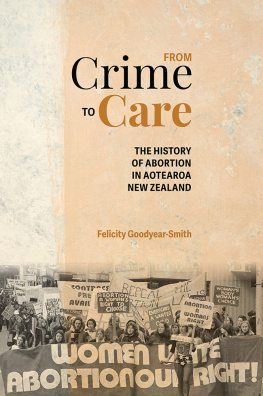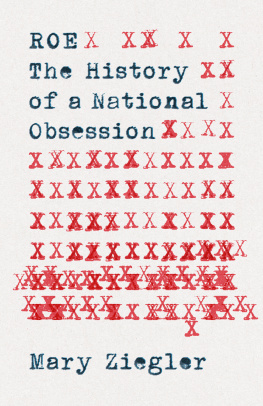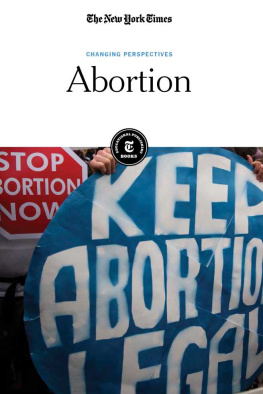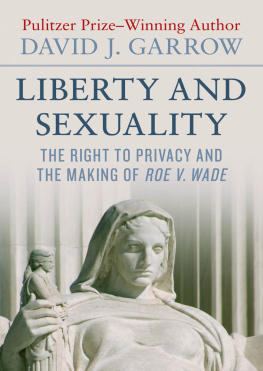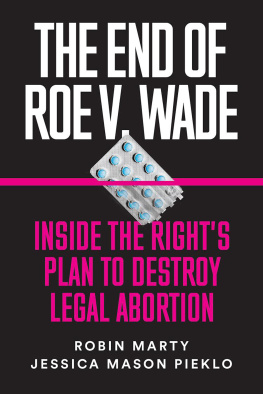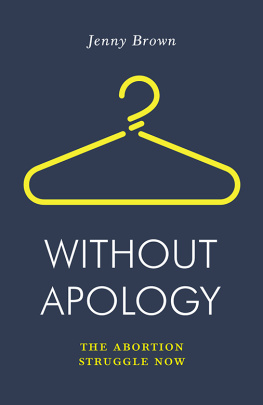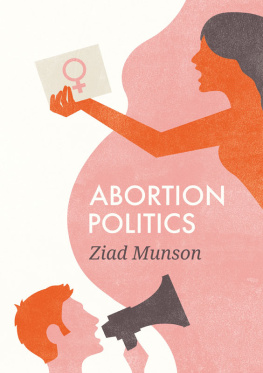The Cultural Lives of Law
Edited by Austin Sarat
The Street Politics of Abortion
Speech, Violence, and Americas Culture Wars
Joshua C. Wilson
Stanford Law Books
An Imprint of Stanford University Press
Stanford, California
Stanford University Press
Stanford, California
2013 by the Board of Trustees of the Leland Stanford Junior University.
All rights reserved.
No part of this book may be reproduced or transmitted in any form or by any means, electronic or mechanical, including photocopying and recording, or in any information storage or retrieval system without the prior written permission of Stanford University Press.
Printed in the United States of America on acid-free, archival-quality paper
Library of Congress Cataloging-in-Publication Data
Wilson, Joshua C., author.
The street politics of abortion : speech, violence, and Americas culture wars / Joshua C. Wilson.
pages cm. (The cultural lives of law)
Includes bibliographical references and index.
ISBN 978-0-8047-8533-4 (cloth : alk. paper)
ISBN 978-0-8047-8534-1 (pbk. : alk. paper)
1. AbortionPolitical aspectsUnited States. 2. Abortion servicesLaw and legislationUnited States. 3. Freedom of speechUnited States. 4. DemonstrationsLaw and legislationUnited States. 5. Pro-life movementUnited States. I. Title. II. Series: Cultural lives of law.
HQ767.5.U5W56 2013
363.460973dc23
2013011194
ISBN 978-0-8047-8870-0 (electronic)
To my parents, Kathy and Jerry Wilson
Contents
Planned Parenthood Shasta-Diablo v. Williams
Schenck v. Pro-Choice Network of Western New York
Hill v. Colorado
Acknowledgments
There are too many points competing to be the one that marks when this book project began. As a result, the number of people I want to thank for contributing to this book grows the more I think about it. I will take Horaces advice in the Art of Poetry, though, and start in medias res, or in the middle of things, as opposed to some preferred ab ovo point. This spares the reader like the music at the Oscars spares the audience, but it upsets me. My first act of thanking the books contributors, then, is to thank the many friends, family members, and colleagues who are not mentioned here by name.
When people ask me why I chose to work on this topic, I tell them I wanted to find a compelling story about law and society and that I found one in these abortion politics cases. This point leads to the next mention of those that I would like to thank for helping with this project. William Fletcher drew my attention to this interesting set of cases; William Muir inspired me to write the stories that others do not have the time to write; and Kristin Luker showed me the complexity and value of studying abortion politics.
I would also like to thank all of those who helped nurture and transform my early shapeless ideas about these cases into something with form and structure. The usual caveats apply to them and to all other people who have provided valuable advice and commentary on this project. These people contributed their time and thoughts, but I fully own any faults with the book.
That said, I would like to thank those who helped make my time as a graduate student at the University of California, Berkeleys Jurisprudence and Social Policy Program so valuable, specifically, Hadar Aviram, Jack Citrin, Susan Dennehy, Malcolm Feeley, Jackie Gehring, Alejandra Huneeus, Dorit Rubinstein, Shalini Satkunanandan, and Rachel Van-Sickle-Ward. I would also like to thank my colleagues in the John Jay College Political Science Department who have encouraged dedication to research, particularly my chief collaborator, daily editor, and friend, Erin AckermanIll miss having the office across the wall from you.
It would be remiss of me to not thank the various conference discussants, lecture audiences, and journal peer-reviewers and editors who have read, listened to, commented on, and encouraged parts of this project over the years. Special thanks in these regards needs to be directed to those who, for no reason beyond their own generosity, took the time to give particularly thorough and helpful comments to someone they barely knew. George Lovell, Kwai Ng, and especially Julie Novkov all greatly exceeded their roles as conference discussants and panelists by expressing genuine interest in my work and providing various forms of support for years after our respective conference panels ended. I would also like to express my deep appreciation to Jeffrey Dudas and Laura Beth Nielsen, who both chose to cross the divide from anonymous peer-reviewers to peers and lent their continued help to this book and other scholarly endeavors. Jeffrey and Laura Beth were both profoundly important in helping me reconceive my approach to my interview data. Finally, I would like to thank Lynn Chancer, who helped shepherd my manuscript to a press through our work in the CUNY Faculty Fellowship Publication Program and who gave continuing support after the program had run its course.
I am deeply grateful for and indebted to three additional people who have given more to me and to this project than anyone could reasonably hope for. First, I need to thank Robert Kagan for listening to the unstructured and rambling ideas that preceded this project; for helping me move it to be something beyond storytelling; for caring enough to give incredibly thorough comments on so many early drafts; for opening the door to academia; and, finally, for simply being a friend. No one could ask for a more thoughtful or kinder mentor than Bob.
Second, I must thank both of my parents, to whom I have dedicated this book. While this mention strays, quite literally, into the ab ovo territory that I said I would not enter, I would not have ever written a book, let alone gone to college, without my mothers efforts to address my evermounting frustration with grade school and junior high. Returning to the safety of the in medias res position, I cannot say thank you enough to my father, who has not only read and reread every draft or product related to this book but also read almost every academic piece that I have written since I left high school. Securing that this book was a true family affair, I also need to thank my sister, Leah, for her help in transcribing some of the early interviews and for providing general encouragement.
Sincere thanks is also given to all of the interviewees who took the time to talk to me on the phone and who invited me into their homes, workplaces, and favorite cafes. Without their kindness the research would not have been as enjoyable as it was, and without their trust and patience this project truly could not exist. I have done my best to honor their trust through honest, accurate, and detailed work.
I am grateful to the University of California, Research Foundation of the City University of New York, Professional Staff CongressCity University of New York Research Award Program, City University of New York Faculty Fellowship Publication Program, John Jay College Research Assistance Program, The Field Psych Trust, and Berkeleys Center for the Study of Law and Society for their financial support at different stages of this project. Their assistance allowed for much-needed time to do field work and write. Speaking of field work, this book would not have been possible without the help provided by court administrators and the opportunity to do research in the University Archives at the University at Buffalo, The State University of New York (SUNY Buffalo) . As Kristin Luker and Erin Ackerman have both rightfully noted, we should always take the time to honor librarians.
One should also always thank good editorsespecially when one tends to be wordy or is known to frequently digress. I have had the fortune to complete this book under Kate Wahls guidance. Kates initial read of the manuscript produced detailed, critical comments that convinced me that I wanted to work with her. The continued care that she and Frances Malcolm have provided through the editing and production process reaffirm that I made the right choice. I hope that we can work together again on the next book. I would also like to thank Austin Sarat for both publishing an earlier article related to this greater project and including this book in his edited series,
Next page

